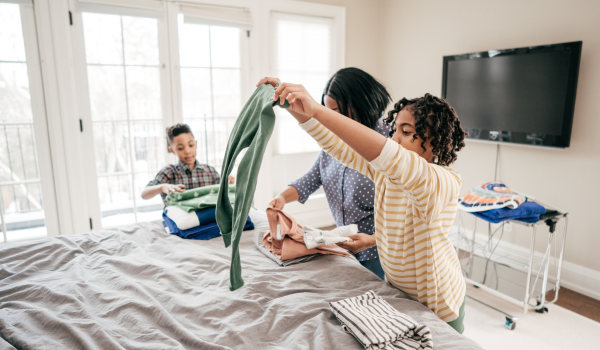Chores. We all have them. We all need them done. But do your kids need chores? Is it really important for your kids to have chores? You bet it is!
Chores matter. It’s that simple. When we are tired and the chore needs done, whether it’s loading the dishwasher, picking up toys or taking out the trash, it can seem easier to just do it ourselves. It only takes a minute to do the chore but sometimes it can take longer to beg, plead and bargain for your kids to do the same action. So we end up doing it ourselves. But who have we helped? Not our kids!
Why Chores Matter for Kids
It’s important for kids to have chores. I’m not talking about an extensive list of daily work, but instead, teaching kids the value of being responsible for what they have and helping out in the house.
When a child is responsible for chores (responsibilities), they learn life skills. It teaches basic responsibility, work ethic and even teamwork. On the flip side, kids that are raised without chores, without helping out in the house, are more likely to grow up with a feeling of entitlement.
Chores, or responsibilities, will help children grow into competent adults. Kids who have learned the importance of cleaning up after themselves, taking care of their possessions, and helping around the house, grow into teens and adults that make good roommates, partners and spouses.
Getting Your Kids to do Chores
There are many times when it seems easier to just do the chores by yourself. You may feel as though you need to redo the task if it’s not done to your liking. But try to resist. Encourage your kids by praising their effort and accepting the way the chore is done. No, it won’t be perfect. But like most things in life, it will get better with practice and time.
Kids as young as 2 can begin with simple chores. A 2 or 3 year old may need some assistance, but let them help where it’s appropriate. Preschool aged kids can help feed pets, assist in unloading the dishwasher, and put shoes away. They can help clear the table after a meal and wipe up spills or messes. When a chore is done repeatedly, like putting toys away after playing, it becomes an ingrained habit. And good habits can carry through with us well into adulthood.
As your kids get a little older, you’ll discover what they are capable of doing. They are probably capable of more than you think. Folding towels, setting the table, taking out the trash, cleaning their bedroom, putting clothes away, bringing in groceries and putting them away are all basic ways that kids can assist in the home and be a contributing part of the family. There are lots of ways your kids can help around the house.
Focus on Effort, Not Results
Kids are kids. As they should be. Their job is to play and learn – – not to be perfect or to be a mirror image of us. Your child probably won’t make his/her bed as well as you, or wipe the counter as well either. Maybe the corners of the hand towels don’t match up, but it’s okay.
We want to praise their effort in helping, not whether the job was done to our satisfaction. “You must be so strong to carry that big bag of trash,” will go further than you might think. Focus on what your child is doing well, and ignore what’s not perfect.
When kids have daily chores, the responsibility becomes part of the day. Chores don’t have to be a list taped to the fridge. When every member of the family helps, chores become habit. When an activity becomes habit, like making your bed, you’ll find you no longer need ask/beg your kids to make their beds. It’s simply habit.
Therapists for Kids in Washington and Canonsburg, PA
Are you worried about your child? If your child’s behavior or attitude is causing you worry, you may want to consider talking to a therapist. We offer online tele-health in Pennsylvania. If you’re local to Washington, PA or Canonsburg, PA, if you have any questions or would like to get to know us a little better, please call (724) 503-6670 or email us at admin@inthenowcounseling.org. You can also talk to us on Facebook and Instagram, too.










